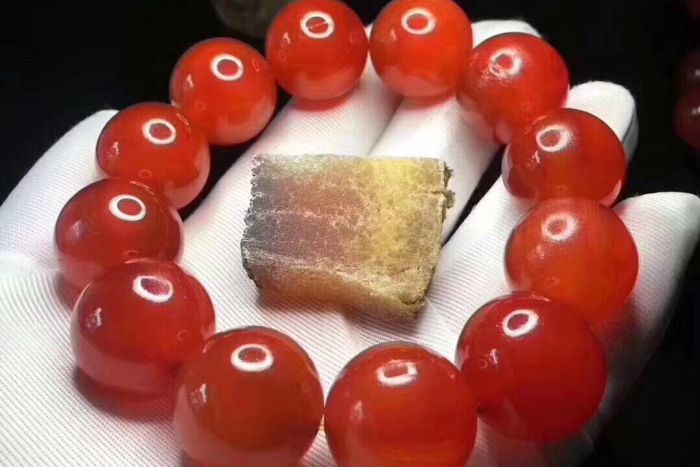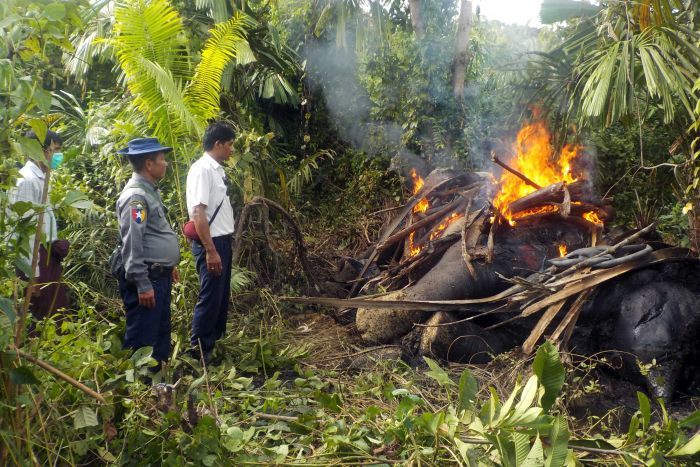The trader who sells online wants the customers to know that the elephant was killed quickly, with fresh blood still inside its veins.
The man holds two layers of hardened and dried fat in front of a light to display the rich blood-red color, and circles mark where he will sever spheres and turn them into beads. These beads are then used to make bracelets.

Aung Myo Chit, the country coordinator at Smithsonian institution in Myanmar, told 7.30 that it is the reason why they try to skin the elephant immediately it falls down. Waiting for a day or two will drop the color because the concentration of blood will reduce, he added.
They are now targeting every elephant.
The trade in elephant skin for skin products, bogus treatments, and beads was discovered a few years ago. The conservationists are now getting worried.
Christy Williams, country director at World Wildlife Fund, said that the new skin trade has become so serious that Myanmar’s elephants might become extinct by 2030 if left unchecked.
While hunting for ivory targets about 10% of male elephants with tusks, the new skin trade has put every single elephant in the sight of a poacher’s gun.
Mr. Williams said that this has become a game changer for them and any living elephant in the wild happens to be a fair game.
In May last year, a whole family of elephants was killed in Ayerawaddy region in Myanmar by skin poachers. All the 25 males, females, and calves were slaughtered with their blood turning the river red.
William compares what poachers do to animals like elephants, whales, dolphins, and great apes to genocide.
Once an elephant is killed in the forests of Myanmar, the illicit skin is smuggled towards China through Laos or Thailand. According to Williams, 90% of the consumers are Chinese.
Much of the skin from the elephant is sold online. The conservation group Elephant Family discovered photos of the trader displaying his blood-red products in September. They managed to track down the origin of the beads.
Although carved bead bracelets known as wenwan have been traditional items for jewelry in China, it is until 2014 when the use of elephant’s skin emerged. This is when an online trader called Jaz came up with the new product.

In reference to investigations by Elephant Family, Jaz was boasting about his exploits. He is reported to have said ‘I invented the elephant skin beads.’ He also said that he travels to Myanmar to source the raw material in person.
Jaz is also the one who pioneered the online trade of powdered elephant skin being sold as a remedy for stomach problems and mixed into lotions for skin problems.
According to Aung Myo Chit, these products don’t have any proven medicinal value and can be potentially harmful to the consumer.
To kill the elephant in a slow and excruciating manner, poachers use arrows tipped with strong poison and homemade guns. The poison spreads to the rest of the body in two to three days. This is an indication that every inch of the elephant’s skin has the poison.
That poison is now being consumed and rubbed onto the skin of consumers who buy these products.
Range Power
According to conservationists, urgent action should be taken to protect the remaining 2,000 elephants in Myanmar.

The Illegal Wildlife Trade conference was recently held in London with safeguarding African elephants being the key topic. The emerging trade in Asian elephant skin didn’t take the center stage.
Activists have now shifted their focus. They want to alert the world about the dangers posed by elephant skin poaching
Ranjan Marasinghe is the head of enforcement of the Department of Wildlife Conservation in Sri Lanka. He told 7.30 that they are aware of the multiple threats facing Asian elephants and their concern is that the skin issue will spread to all range states if unaddressed.
To Curb Elephant Poaching
The Government in Myanmar is strengthening the law this year to bring in a mandatory jail term for poachers. A small number of elephants have been fitted with GPS collars to allow rangers to focus their patrols.
Shockingly, half of the collared elephants were killed in the first year after the World Wildlife Fund fitted them with the tracking equipment.

Christy Williams hopes Myanmar has a unique way to protect its wildlife. He suggests recruiting some timber workers as forest rangers. WWF is planning a training facility to make this a reality.